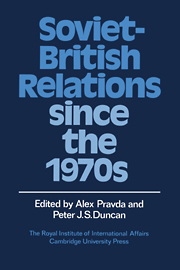Book contents
- Frontmatter
- Contents
- Contributors
- Acknowledgments
- 1 Introduction: pre-perestroika patterns
- 2 The historical perspective
- 3 Soviet perspectives on Britain and British foreign policy
- 4 British perspectives on the Soviet Union
- 5 The security dimension
- 6 Anglo-Soviet relations: political and diplomatic
- 7 The Soviet Union and the Left in Britain
- 8 Anglo-Soviet cultural contacts since 1975
- 9 Trade relations: patterns and prospects
- 10 Doing business with the USSR
- 11 Conclusions: Soviet-British relations under perestroika
- Index
3 - Soviet perspectives on Britain and British foreign policy
Published online by Cambridge University Press: 29 October 2009
- Frontmatter
- Contents
- Contributors
- Acknowledgments
- 1 Introduction: pre-perestroika patterns
- 2 The historical perspective
- 3 Soviet perspectives on Britain and British foreign policy
- 4 British perspectives on the Soviet Union
- 5 The security dimension
- 6 Anglo-Soviet relations: political and diplomatic
- 7 The Soviet Union and the Left in Britain
- 8 Anglo-Soviet cultural contacts since 1975
- 9 Trade relations: patterns and prospects
- 10 Doing business with the USSR
- 11 Conclusions: Soviet-British relations under perestroika
- Index
Summary
In this chapter I shall attempt to describe how Soviet policy makers view Britain and British foreign policy. Since direct information about this is scarce, it is necessary to examine the views expressed by Soviet journalists and academic specialists. While these cannot be considered official statements on a par with those of Party or foreign ministry representatives, they may reflect the views of the leadership or of informed policy opinion.
The creation of soviet perceptions
Attitudes to Britain in the Soviet Union are conditioned by a number of factors: the historical experience and memory of British-Russian and British-Soviet relations; official Marxist-Leninist ideological doctrines; and personal experiences which Soviet citizens have of visits to the United Kingdom or of dealings with British people. The continuing (and much resented) restrictions on travel to the West limit access to Britain for Soviet people. Not only teachers of English but even many specialist analysts of British affairs have never visited the UK. The expansion of tourism to the Soviet Union and of cultural links has not made acquaintance with Britons an easy affair for ordinary Soviet citizens. Although English, in its British form, is still the most widespread foreign language taught in schools and universities, perceptions of Britain are influenced by the writings of such authors as John Galsworthy and Charles Dickens (who still seems to be the Russians’ favourite British writer). For a younger generation, Britain is remarkable above all for its rock musicians.
In spite of the Crimean War and the Anglo-Russian rivalry in South-West Asia, relations between Tsarist Russia and Britain were often friendly.
- Type
- Chapter
- Information
- Soviet-British Relations since the 1970s , pp. 47 - 67Publisher: Cambridge University PressPrint publication year: 1990



